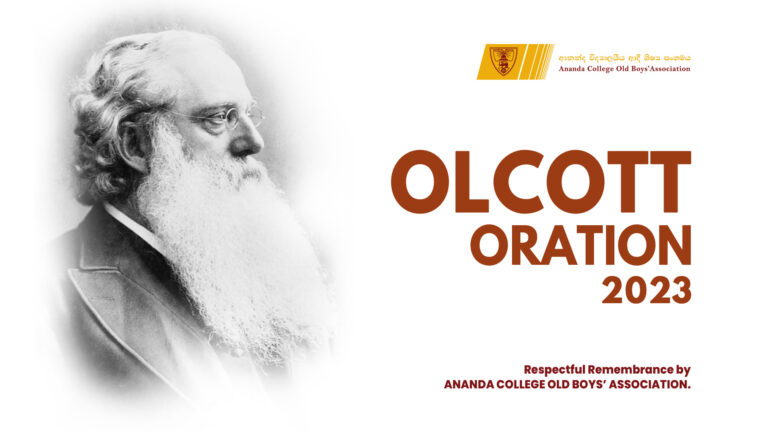Since the beginning of the 16th century, Ceylon had been occupied by the Portuguese then by the Dutch and thereafter by the British until we gained independence in 1948.
It was the “Pirivena” system of education that prevailed in ancient Ceylon to provide Buddha Dhamma education to student monks but lay students were also accommodated.
The establishment of Portuguese rule was in the maritime areas until the middle of the 17th century. The Dutch administration commenced in 1658 and the Dutch capitulated to the English in 1796.
Buddhism, the Buddhist culture and the Buddhist education were in decline in our motherland under foreign domination from 1505 to 1880 over 375 years. The Buddhists of Ceylon had to struggle to maintain their religion. The traditional system of Buddhist education had gradually fallen into disuse.
It was in this environment that the famous five debates, more importantly, the “Panadura debate” between the Buddhist monks, Rev. Hikkaduwe Sumangala Thero and Rev. Mohottiwatte Gunananda Thero representing the Buddhist and Christian Clergy on their part took place 150 years ago in 1873 in Panadura.
Dr. Peebles an American national who happened to be in Ceylon during the debate published an article titled “Buddhism and Christianity Face to Face” which went into the hands of Col. Henry Steel Olcott in America.
Col. Olcott having read the article decided to visit Ceylon to study the Spiritual teachings of Buddhism. He with his adviser Madam Helena Blavatsky arrived in Ceylon on 17th May 1880 and having admitted “Pansil” both declared Buddhists on 25th May 1880.
Then onwards Col. Olcott maintained close dialogue and relationship with Maha Sangha and Buddhist leaders, especially Ven. Hikkaduwe Sumangala Thero and Ven. Mohottiwatte Gunananda Thero.
When Col. Olcott travelled in the country he was dismayed by the state of Sinhala Buddhists which seemed backessered and suffer due to forced colonial rule and ignorance.
As initial steps for Sinhala Buddhists to come out of this unfortunate state, Col. Olcott established the “Sinhala Buddhist Fund” at Kelaniya Historical Temple with the aim of reviving the Buddhist education system in the country.
The Buddhist Theosophical Society was formed in Colombo on 17th June 1880, under his presidency mainly for the purpose of establishing Buddhist English schools.
Col. Olcott pointed out the importance of promoting education in a Buddhist environment through a structural school system for Buddhist children which will help revive the Sinhala Buddhist nation. The scheme he proposed for Buddhist English education received the approval of Maha Sanga and the Buddhist leaders.
On a decision taken by the leaders at a special meeting of Colombo Theosophical Society held on 23rd October 1886, where Rev. Hikkaduwe Sumangala Thero, Rev. Mohottiwatte Gunananda Thero and Col. Henry Steel Olcott were present, on 1st November 1886, the first Buddhist English school, Pettah, came into being at No.61, Maliban Street, Colombo, with 37 students and Englishman Mr. C.W.Leadbeater being the first Principal of the school.
The school was re-located at its present location at Maradana Paranawadiya on 17th August 1895 and named “Ananda College”.
We Srilankan Buddhists are ever grateful to Col. Olcott who was instrumental in introducing the Buddhist English education system in Sri Lanka, which impacts the nation today.
In 1880 when there were over 800 Christian schools, the number of Buddhist schools was limited to three. Having established Ananda College in 1886, Col. Olcott was responsible for establishing 143 Buddhist schools throughout the Island during the period 1886 to 1890. The total number of schools established in the country under his scheme was 483, including Nalanda, Dharmaraja, Rahula, Visaka, Mahinda, and Sumangala Colleges.
Ananda College can be said to have fulfilled the aspirations and ambitions of her founders and truly be proud of having nurtured several thousands of valuable citizens. During the past 137 years they have taken leadership in countless spheres of human activity be it, medicine, engineering, economics, accounting, judiciary, legislature, state service, state security, admiration for diplomatic service, or sports. It would be far too lengthy to mention the names of them.
Col. Olcott was instrumental in designing the Buddhist flag and made representations to the British Government to obtain approval for Wesak Full Moon Day a holiday in Sri Lanka.
In recognition of the invaluable and selfless services of Col. Henry Steel Olcott to the cause of Buddhism and Buddhist education. Prime Minister Hon. Dudley Senanayake and the parliament of Ceylon in 1967 conferred on him the unique honour of “National Hero of Ceylon”. Col. Olcott was the only foreigner to be so honoured.
It has been an important event to look forward to, the Olcott Oration, which is dedicated to the founders of Ananda College, organised by Ananda College Old Boys’ Association, annually.
This year the Olcott Oration will be delivered by Prof. Buddhima Indraratna, a distinguished Old Anandian, Professor of Civil Engineering and Director Transport Research Center, University Technology, Sydney, Australia on 25th November at 4.30 p.m. at Kularatna Auditorium, Ananda College.
Find out more financial news and information by engaging Buzzer.lk and Buzzer Financial.




